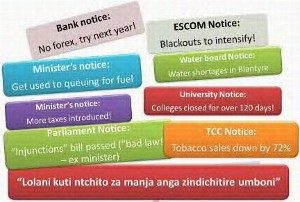 Tobacco is not often linked to countries’ development agendas. But in Malawi, tobacco is king – known as “the green gold” it is vital to their economic well-being. An agriculture-based economy, tobacco is a major source of foreign currency and it accounts for more than 70% of Malawi’s total export earnings. The sector also employs between 600,000 and 2 million in a labour force of 5 million.
Tobacco is not often linked to countries’ development agendas. But in Malawi, tobacco is king – known as “the green gold” it is vital to their economic well-being. An agriculture-based economy, tobacco is a major source of foreign currency and it accounts for more than 70% of Malawi’s total export earnings. The sector also employs between 600,000 and 2 million in a labour force of 5 million.
While many argue against dependence on often volatile commodity-based sectors, efforts are underway to diversify the country’s agricultural industry, which everyone agrees will take time. In the interim, Malawi faces real challenges owing to the fortunes of the annual tobacco crop. In a banner year, when growers are able to fetch good prices for their crops, Malawi is able to build up adequate foreign currency reserves. Alternately, when the country does not bring in a bumper crop, foreign currency reserves become depleted. This situation creates unpredictability for companies that rely on payments in foreign currency.
To counter this predicament, an African multilateral bank is making inroads. They have devised a practical solution to protect their credit lines while also helping the country to continue doing business even in times of foreign currency shortages.
In the most recent transaction, the bank has extended a $40 million credit facility to one of Malawi’s leading tobacco companies. The facility will help the company process and sell tobacco to international buyers in Cyprus, Egypt, Germany, Netherlands, The People’s Republic of China, Singapore, South Korea and the United States.
What makes this transaction unique? It is part of a Currency Swap program – an initiative created by the bank to ease pressure caused by the ongoing forex shortages in Malawi.
Under the program, the Reserve Bank of Malawi provides specific approval for the bank to book their loans in US dollars while providing advances in local currency to their Malawian clients. The international buyers would then purchase the tobacco in US currency, which helps bring in much needed foreign currency to cover the bank’s transfer restriction exposure. The bank is currently managing three transactions under the Currency Swap program.
In some years, the forex challenge has resulted in fuel shortages – as the country did not have available foreign exchange to import enough oil to satisfy domestic demand. Positive changes made by the new Banda government have reassured investors. The government has put in place measures to ensure improved local access to foreign exchange at regulated prices. For the business community this has been an encouraging sign. Innovations, such as the Currency Swap program are expected to buttress a business environment seen to be improving.
With shared mandates to support African member countries’ economic development, ATI has had a long standing partnership in Malawi with the multilateral bank. In one transaction, for instance, ATI insured the bank’s non-payment risk on a credit facility that enabled the government to import oil during a period of severe shortage. In this current transaction, ATI is protecting the bank’s $40 million facility against potential non-payment risks by the international buyers under a Master Policy scheme that offers cover against default on each buyer.
“By partnering with respected institutions in Malawi, our objective is to pave the way for other potential investors. Essentially, we hope to set a trend that will help to redefine what is possible for investors in this country,” notes Pizzaro Lukhanda, ATI’s Resident Underwriter in Malawi and Zambia.
Notifications